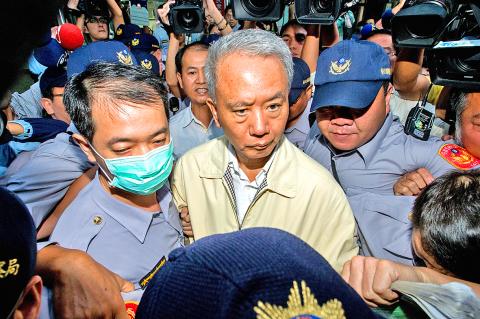Ting Hsin International Group (頂新集團) executive Wei Ying-chun (魏應充) was indicted yesterday on charges of fraud, forgery and food-related regulatory violations for his role in an oil adulteration scandal that erupted last year. Wei, former chairman of Cheng I Food Co (正義股份), Ting Hsin Oil and Fat Industrial Co (頂新製油實業) and Wei Chuan Foods Corp (味全食品工業), faces up to 15 years in jail if convicted.
Also indicted was former Wei Chuan general manager Chang Chiao-hua (張教華) and former Ting Hsin Oil and Fat general manager Chang Mei-feng (常梅峰), as well as 10 other Wei Chuan employees.
Ting Hsin Oil and Fat, which made cooking oils marketed under the Wei Chuan brand, was found in November last year to have used adulterated oils obtained from Chang Chi Foodstuff Factory Co (大統長基) in its finished products.

Photo: Liao Yao-tung, Taipei Times
Chang Chi used cottonseed oil and other cheap oils in its more expensive grapeseed and olive oils, and, in some cases, used copper chlorophyllin to make the substitutes look more like olive oil.
According to the indictment, Ting Hsin Oil and Fat manufactured 65 olive oil and grapeseed oil products for Wei Chuan using oils supplied by Chang Chi between 2007 and last year, generating more than NT$792 million (US$26 million) in revenue.
Prosecutors allege that Wei and Chang were aware that they were buying adulterated oils from Chang Chi because they were informed by their quality-control department that Chang Chi’s oils were problematic, but insisted that the supplier’s products continue to be purchased.
Wei and Chang have denied the charges.
Wei has been detained by prosecutors since Oct. 17 over his involvement in a more recent edible oil scandal.
In the latest case, Ting Hsin Oil and Fat and Cheng I, another company previously led by Wei, was found to have used oils meant for animal feed in lard-based cooking oil products. The oils were also used by Wei Chuan in its food products.
Wei resigned from his posts as chairman of Wei Chuan, Ting Hsin Oil and Fat, and Cheng I — all subsidiaries of the Wei family-owned Ting Hsin International Group — on Oct. 9 following the more recent food scare.

TRAGEDY STRIKES TAIPEI: The suspect died after falling off a building after he threw smoke grenades into Taipei Main Station and went on a killing spree in Zhongshan A 27-year-old suspect allegedly threw smoke grenades in Taipei Main Station and then proceeded to Zhongshan MRT Station in a random killing spree that resulted in the death of the suspect and two other civilians, and seven injured, including one in critical condition, as of press time last night. The suspect, identified as a man surnamed Chang Wen (張文), allegedly began the attack at Taipei Main Station, the Taipei Fire Department said, adding that it received a report at 5:24pm that smoke grenades had been thrown in the station. One man in his 50s was rushed to hospital after a cardiac arrest

PUBLIC SAFETY: The premier said that security would be tightened in transport hubs, while President Lai commended the public for their bravery The government is to deploy more police, including rapid response units, in crowded public areas to ensure a swift response to any threats, President William Lai (賴清德) said yesterday after a knife attack killed three people and injured 11 in Taipei the previous day. Lai made the remarks following a briefing by the National Police Agency on the progress of the investigation, saying that the attack underscored the importance of cooperation in public security between the central and local governments. The attack unfolded in the early evening on Friday around Taipei Main Station’s M7 exit and later near the Taipei MRT’s Zhongshan

ON ALERT: Taiwan’s partners would issue warnings if China attempted to use Interpol to target Taiwanese, and the global body has mechanisms to prevent it, an official said China has stationed two to four people specializing in Taiwan affairs at its embassies in several democratic countries to monitor and harass Taiwanese, actions that the host nations would not tolerate, National Security Bureau (NSB) Director-General Tsai Ming-yen (蔡明彥) said yesterday. Tsai made the comments at a meeting of the legislature’s Foreign Affairs and National Defense Committee, which asked him and Minister of National Defense Wellington Koo (顧立雄) to report on potential conflicts in the Taiwan Strait and military preparedness. Democratic Progressive Party (DPP) Legislator Michelle Lin (林楚茵) expressed concern that Beijing has posted personnel from China’s Taiwan Affairs Office to its

SAFETY FIRST: Double the number of police were deployed at the Taipei Marathon, while other cities released plans to bolster public event safety Authorities across Taiwan have stepped up security measures ahead of Christmas and New Year events, following a knife and smoke bomb attack in Taipei on Friday that left four people dead and 11 injured. In a bid to prevent potential copycat incidents, police deployments have been expanded for large gatherings, transport hubs, and other crowded public spaces, according to official statements from police and city authorities. Taipei Mayor Chiang Wan-an (蔣萬安) said the city has “comprehensively raised security readiness” in crowded areas, increased police deployments with armed officers, and intensified patrols during weekends and nighttime hours. For large-scale events, security checkpoints and explosives